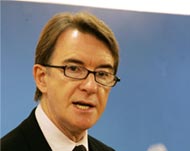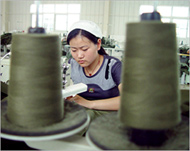US offers to make ‘steep’ tariff cuts
The top US trade official has laid out a new proposal on agricultural tariffs and subsidies, saying the EU and Japan must now promise to do more to improve their own offers.

With two months remaining before a deadline for a framework global trade treaty, ministers from World Trade Organisation member countries were once more confronting the thorny issue of US and EU farm subsidies.
“The US is willing to take some pain,” US Trade Representative Rob Portman said on Monday. “But those who subsidise more need to reduce more.”
Portman said Washington was ready to make “steep tariff cuts” as ministers from the world’s largest commercial powers gathered to revive global trade talks.
He called on the EU and Japan to come up with improved offers for reducing agricultural support programmes.
Balanced ratio
The EU “uses about three times more support than we do”, Portman said.
 |
|
Peter Mandelson called the |
“The ratio needs to be about two to one to be rational, balanced and practical.”
European Union Trade Commissioner Peter Mandelson called the proposal a “constructive step”, but said it still needed further assessment.
The US has “indicated readiness to match the EU’s willingness to eliminate all exports subsidy programmes,” Mandelson said in a statement.
“We now need to move to a serious discussion of timetables for phasing out support,” he said.
Deadlock
A ministerial meeting in Paris last month failed to break the deadlock, although the EU took a step in that direction, presenting a detailed but tentative offer to cut import tariffs at talks with Portman and ministers from India and Brazil.
 |
|
Rob Portman said developing |
On Monday, Portman said the US was prepared to go beyond
the EU’s proposal, provided other countries followed suit.
“To jump-start our stalled negotiations, the US is prepared to move, and move aggressively,” he said in an opinion article published on Monday in the Financial Times newspaper.
But, he wrote, “greater cuts must be required by the European Union and Japan, which have much larger subsidies”.
However, he wrote that the success of global trade does not just depend on the developed nations.
“Developing countries must also offer contributions, commensurate with their role in agricultural trade.”
Agriculture policy
Canada’s Trade Minister Jim Peterson commended the US
proposal, which he said could give a fresh impetus to negotiations.
“I believe this initiative by Mr Portman is just what we needed,” he said. “This is a positive start but we still have a long way to go.”
Both Portman and Mandelson are under pressure to make
difficult concessions, trade officials said.
|
“To jump-start our stalled negotiations, the US is prepared to move, and move aggressively” Rob Portman, |
WTO Director-General Pascal Lamy has said that the EU and the US will have to make adjustments in agriculture policy if progress is to be made in the present round of global trade talks, which is already well behind an original December 2004 deadline.
Lamy believes the EU needs to open its market more to
foreign producers while the US should offer to cut the
level of financial support it gives its farmers, his
spokesman Keith Rockwell said.
“Movement in those two areas would be helpful not only for
the agriculture negotiations overall, but for the entire round.”
Trade deal
At a Hong Kong summit scheduled for the end of the year,
the WTO’s 148 members are supposed to agree on an outline
for a global trade deal.
EU farm reforms adopted in 2003 will convert the bulk of the bloc’s production subsidies into animal-welfare and environmental-management grants to farmers – deemed far less trade-distorting under WTO rules.
 |
|
The Doha round of trade talks |
Washington envisages no such change to its current subsidy regime, which provides payouts to farmers when prices fall, allowing US producers to charge artificially low prices.
New treaty
Washington’s trade partners say the cuts they are seeking would mean changes to the 2002 US farm bill, which comes up for renewal in 2007.
After that, a new global trade treaty would be harder to negotiate, diplomats say.
The Doha round – named for the Qatari capital where it was launched in 2001 – is set to conclude next year.
It sets out to boost the global economy by lowering trade barriers across all sectors – with particular emphasis on developing countries.